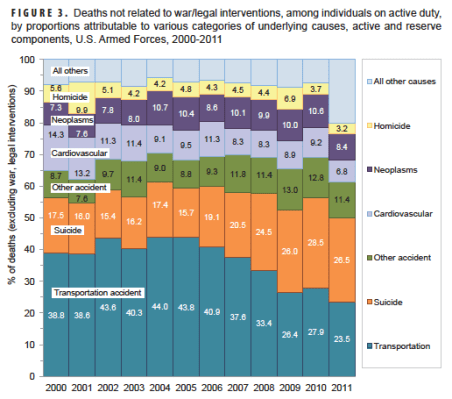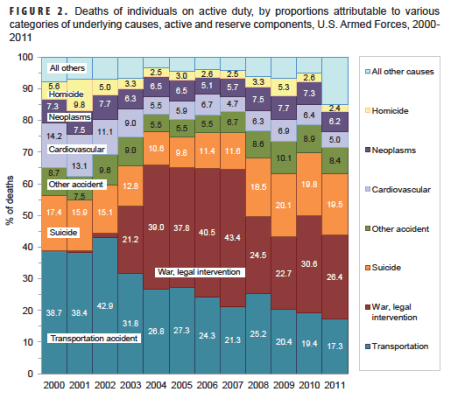 For years, motor-vehicle accidents have killed more U.S. troops than any other non-combat cause. There have been safe-driving campaigns on military posts since troops and transportation first got together. “Many military members are young, single, male, and high-school educated,” the Pentagon’s Medical Surveillance Monthly Report noted in March 2010. “These characteristics are associated with high risk of dying in motor vehicle crashes.”
For years, motor-vehicle accidents have killed more U.S. troops than any other non-combat cause. There have been safe-driving campaigns on military posts since troops and transportation first got together. “Many military members are young, single, male, and high-school educated,” the Pentagon’s Medical Surveillance Monthly Report noted in March 2010. “These characteristics are associated with high risk of dying in motor vehicle crashes.”
That changed Wednesday, with the publication of the May issue of the same monthly report, which tracks trends in troops’ ailments and medical care. In the dry and clinical prose favored by the medical community, the report said that in each of the past two years, more troops have died at their own hands than in motor-vehicle accidents. “From 2005 to 2011, the proportion of deaths due to suicide increased sharply while the proportion due to transportation accidents generally decreased,” Wednesday’s study found. “As a result in 2010 and 2011, suicides accounted for more deaths of service members than transportation accidents.”
(MORE: U.S. Military Suicides in 2012: 155 Days, 154 Dead)
War, fundamentally, is about death. It’s always fascinating to read the military’s explanations about those deaths it wants to avoid, be they civilian casualties in Afghanistan or suicide in the ranks.
 The study noted that suicides accounted for one of every four non-combat military deaths from 2008 to 2011. When combat deaths are added to the tolls, suicide, as shown in this chart, was the cause of one in every five military deaths over the past four years.
The study noted that suicides accounted for one of every four non-combat military deaths from 2008 to 2011. When combat deaths are added to the tolls, suicide, as shown in this chart, was the cause of one in every five military deaths over the past four years.
With one troop a day committing suicide so far this year, the issue isn’t going away. “The Pentagon and the VA are losing the battle on mental and behavioral health conditions that are confronting a lot of our service members,” Senator Patty Murray, D-Wash., told Defense Secretary Leon Panetta at a Wednesday hearing. Their failure, she said, is “resulting in such extreme things as suicides.” Complaints that not enough is being done are met with promises to do more. “We’ve been told for five years,” Murray said, “that the DOD and VA are sitting down on a regular basis addressing this.”
(PHOTOS: Suicide in the Recruiters’ Ranks)
Panetta, who has been in the job less than a year, didn’t offer a strong defense of his department’s efforts. “I’m in charge of a very big bureaucracy, and the fact is that sometimes just the bureaucratic nature of large departments prevents it from being agile enough to respond and do what needs to be done,” he said. “Let [VA] Secretary [Eric] Shinseki and I sit down with you and walk through the steps we’re taking to try to see if we can try to shake the system and make it flow better.”
Murray wasn’t satisfied. “Sitting down and talking with Secretary Shinseki is something we’ve been hearing for a long time,” she countered. “As we transition now out of Afghanistan, this is not going to get more simple…I want more than a meeting.”


